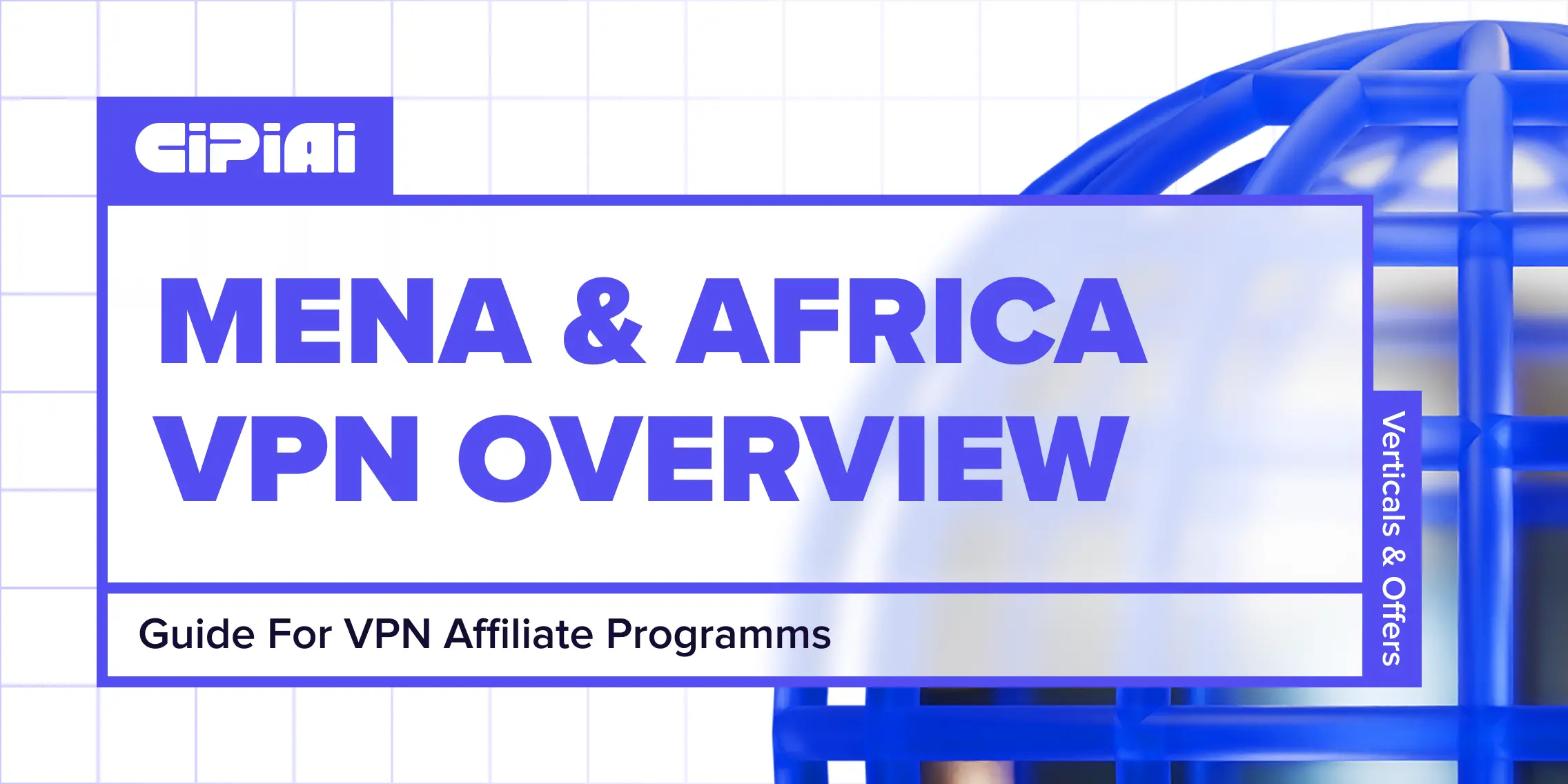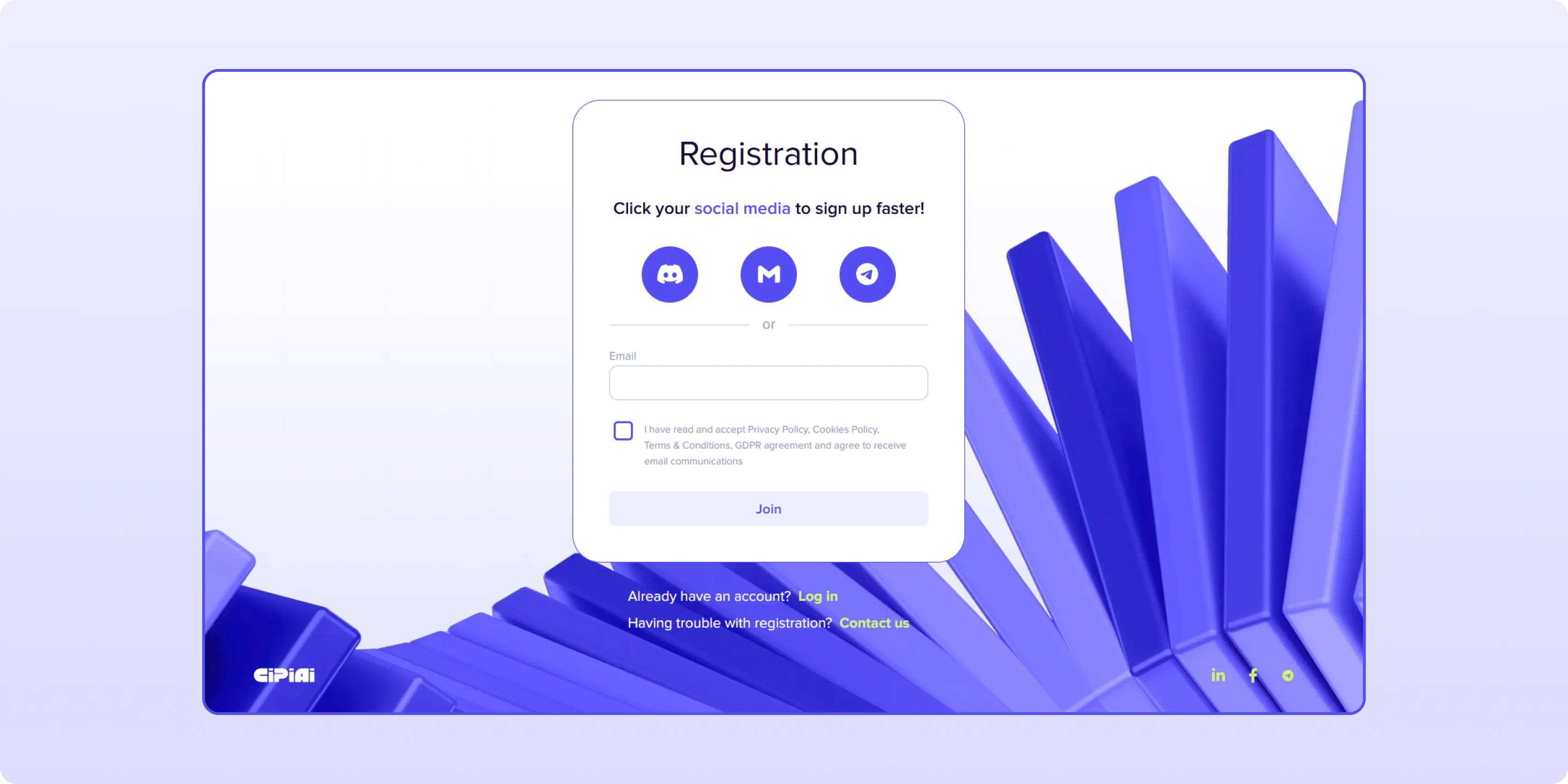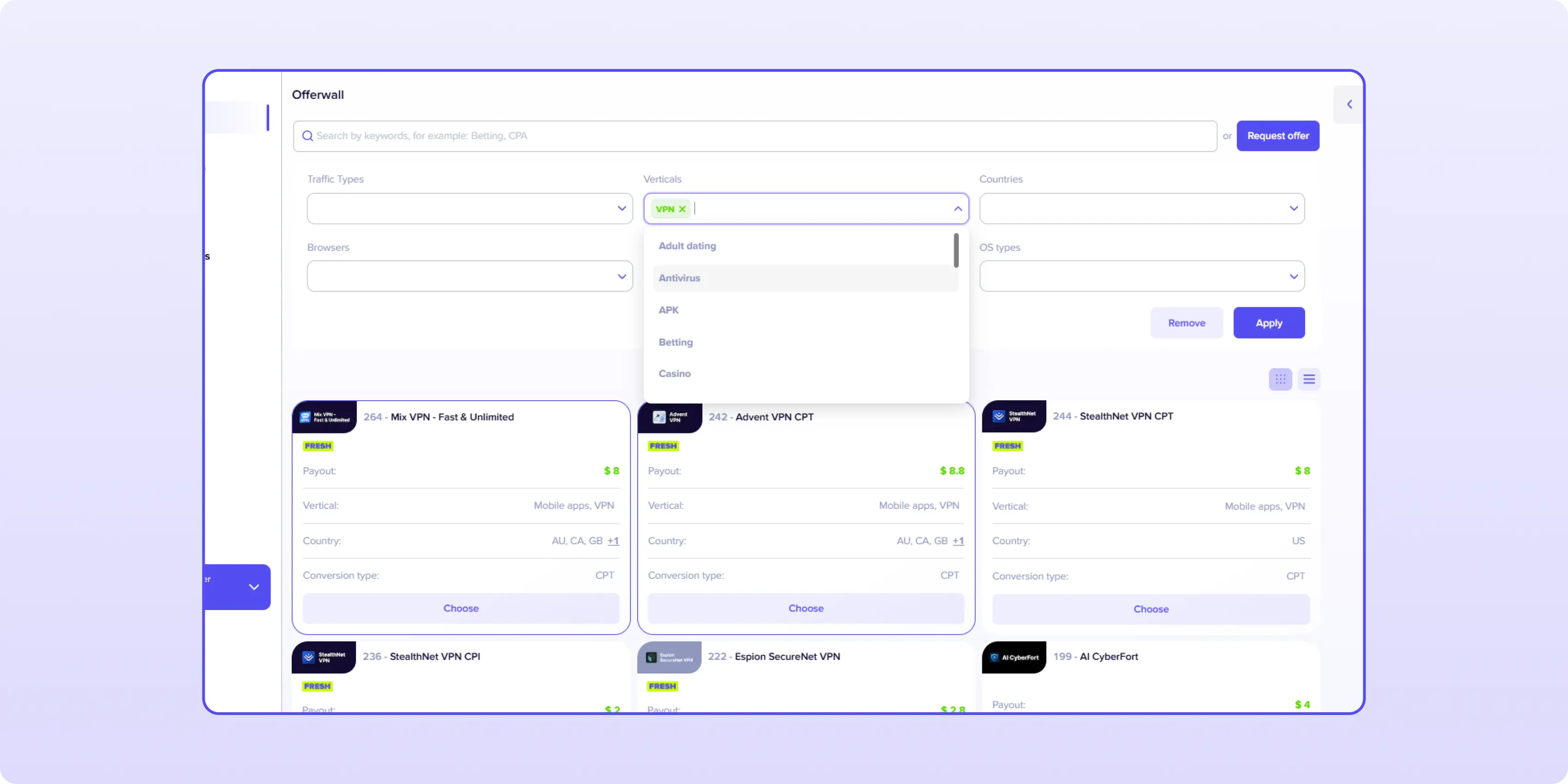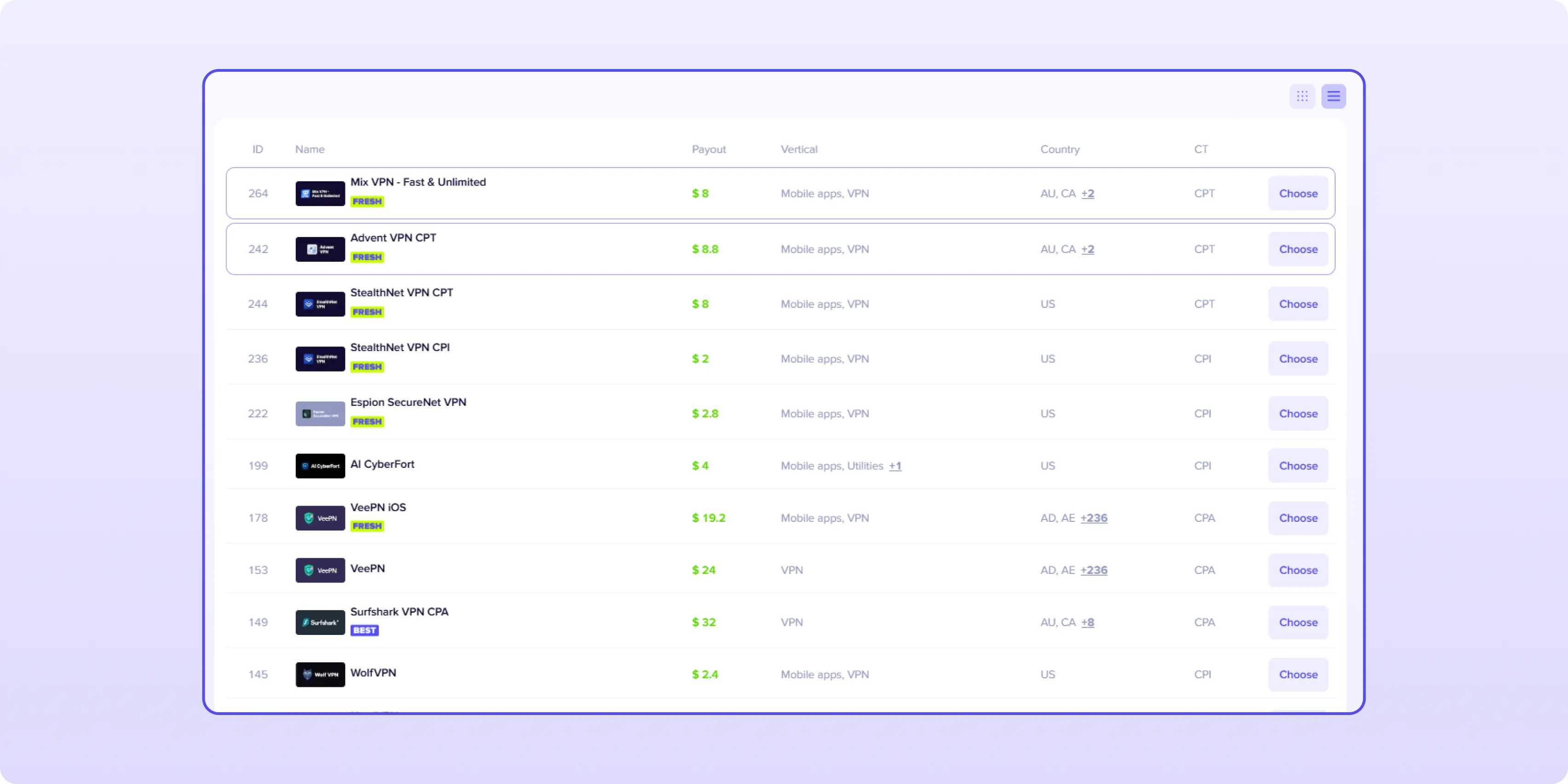
How to Promote VPN Offers in 2025
Looking to run VPN affiliate campaigns in 2025? Discover the best traffic sources, real GEOs, proven offers, and tips from insiders. CIPIAI helps you scale fast.

VPN services have become one of the fastest-growing verticals in affiliate marketing, especially across the Middle East and Africa. The reasons are simple — internet restrictions, high mobile adoption, and rising security concerns make VPNs a daily tool for both individuals and businesses.
For affiliates, this creates a strong opportunity. The demand is not only consistent but also diverse: from users who need to bypass VoIP limits, to companies that protect remote access, to young audiences looking for secure streaming and Wi-Fi.
Key points:
This mix of mass demand and niche needs makes VPN offers one of the most reliable and scalable options for affiliates in the region.
VPN adoption in the Middle East and Africa is already above global averages. According to 99Firms, penetration in the region reaches 35% of internet users. This shows that VPNs are not a niche product — they are used daily by both individuals and businesses to bypass restrictions and secure access.
Regional data confirms the trend. The UAE, Qatar, and Saudi Arabia consistently rank among the top countries for VPN downloads, which reflects a strong and growing demand for such tools. In the UAE, adoption is particularly high. Reports from GlobalBusinessOutlook highlight that VPNs are widely used by residents despite regulatory controls.
The legal framework adds another layer. As described in Wikipedia’s overview of UAE telecommunications, VPN usage itself is not banned. Instead, it exists in a “grey zone” — legal when used for secure communication, but subject to penalties if connected to unlawful activities. This flexibility helps explain the scale of adoption in the Gulf states.
Finally, infrastructure development, the rise of remote work, and growing cybersecurity needs continue to drive the expansion of the VPN market. In practice, this means that affiliates can rely on both consumer demand (VoIP, streaming, privacy) and enterprise demand (remote access, secure networks) to sustain long-term growth.

The VPN market in the Middle East and Africa is not only large today — it is set to expand rapidly over the next decade. According to Cognitive Market Research, the Remote Access VPN market in MENA is projected to grow at a CAGR of around 21% from 2024 to 2031. This is one of the highest growth rates among digital infrastructure segments in the region.
The drivers behind this expansion are clear:
This growth forecast shows that VPNs are no longer just a consumer trend. They are becoming a core infrastructure service in the Middle East and Africa, ensuring long-term opportunities for affiliates who target both B2C and B2B segments.
When it comes to trusted VPN brands, a few providers consistently dominate the market. According to 99Firms, ExpressVPN, NordVPN, and Surfshark regularly appear at the top of global rankings. They also hold strong positions in regional lists tailored for MENA & Africa, making them the most recognizable options for affiliates to promote.
Broader market analysis confirms this pattern. As highlighted in the Fortune Business Insights VPN market report, other important players include PureVPN, OpenVPN, Cisco Systems, and IPVanish. These providers extend the scope of affiliate opportunities beyond mainstream consumer tools and into business-oriented solutions.
It is also worth noting that both ExpressVPN and NordVPN feature not only in consumer-facing rankings but also as part of the enterprise VPN product segment. This dual positioning gives affiliates flexibility — promoting these brands to individual users looking for streaming or privacy, as well as to businesses focused on remote access and security.
VPN usage patterns vary widely across the Middle East and Africa. Some countries show extreme adoption due to censorship, while others use VPNs mainly for convenience and security.
Note: Where statistics are available, the UAE leads with about 38–42% of internet users relying on VPNs in 2024–2025, directly linked to VoIP restrictions.
The Middle East and Africa are mobile-first regions. A high share of internet traffic comes from smartphones, which directly shapes how VPN services are adopted. Data from StatCounter illustrates the gap between mobile and desktop across leading markets.
This distribution confirms why VPN affiliates must prioritize mobile-first funnels. In countries such as Saudi Arabia, Nigeria, and South Africa, mobile adoption exceeds 70%, leaving desktop as a minority channel.
Behavioral data also supports this. According to the Security.org 2025 VPN usage survey, 32% of mobile users enable VPN daily, compared to 29% of desktop users. Most people use VPNs across both devices, but mobile dominates in frequency and convenience.
For MENA and Africa, mobile VPN is critical. Affiliates targeting Android and iOS — with fast onboarding, obfuscation options, and one-tap activation — will convert better in these markets.
VPN adoption in MENA and Africa is not uniform. Users select providers based on their main needs — either bypassing restrictions or ensuring privacy.
Countries such as Iran, Egypt, the UAE, and Qatar rely heavily on obfuscation technologies and anti-DPI (deep packet inspection) protocols. Services like:
are widely promoted for these markets.
In extreme scenarios — where national firewalls block mainstream VPNs — users turn to community-driven tools. IndiaTimes reported a 95% surge in Psiphon-assisted downloads in Tehran during periods of heavy restrictions. Tor Metrics also confirm growth in bridge users, showing how Tor remains a fallback for access when traditional VPNs fail.
In contrast, a growing share of the market values verified privacy over bypass features. Popular services include:
These options resonate with IT professionals, founders, journalists, and expats in the region. For Africa especially, the demand is less about censorship and more about secure Wi-Fi, data privacy, and affordable access — making privacy VPN Africa a key growth niche.
The legal status of VPNs in the Middle East is nuanced. While most countries allow their use, restrictions apply when VPNs are linked to unlawful activities.
In practice, affiliates must not only market VPNs as tools for security and access, but also frame messaging carefully within local legal boundaries.
For affiliates, the VPN vertical in MENA and Africa comes with clear opportunities — but also requires a segmented approach.
Traffic in the region is dominated by smartphones. StatCounter shows that in markets like Saudi Arabia, Nigeria, and South Africa, mobile accounts for 70–80% of web use, which makes mobile VPN traffic in MENA the central driver of conversions.
This means creatives and landing pages must be built with Android and iOS in mind — fast onboarding, one-tap activation, and lightweight flows convert best.
In GCC and Egypt, enterprises commonly use Cisco, Fortinet, and GlobalProtect for remote access. At the same time, there is a growing shift toward ZTNA and SASE solutions. Affiliates can tap into this trend with whitepaper campaigns and consultative funnels around the theme VPN → Zero Trust.
This tailored approach ensures higher conversion rates and positions affiliates as trusted sources of knowledge, not just sales channels.
One of the easiest ways to start working with VPN campaigns in MENA and Africa is through the CIPIAI VPN affiliate network. The platform provides direct access to exclusive VPN offers, making it a reliable choice for affiliates looking to scale in this niche.
To get started:
1. Register with CIPIAI and create your account.

2. Go to the Offerwall section and filter by the VPN vertical.

3. Select an offer with the right GEO and launch your campaign.

CIPIAI’s platform is built for tech-focused affiliates and gives partners access to multiple VPN offers through its affiliate program, ensuring that campaigns are relevant to both MENA and African audiences.
The Middle East and Africa represent one of the most dynamic markets for VPN affiliate programs. High penetration — with more than a third of internet users already relying on VPNs — combined with mobile-first traffic patterns creates strong conversion potential.
For affiliates, the path is clear:
With trusted providers leading the consumer space and a clear legal framework that allows VPNs under defined conditions, affiliates can confidently build campaigns around this vertical. Partnering with networks such as CIPIAI makes it easier to access the right GEO-targeted VPN offers and translate regional demand into long-term results.
Yes, VPN use is allowed in the UAE, but misuse for illegal activities can result in fines. Affiliates should position VPNs as tools for security and communication, not for unlawful purposes.
VPNs are not banned by law in Egypt, but many providers and protocols are blocked by ISPs using deep packet inspection (DPI). This means users need VPNs with obfuscation features to connect reliably.
Yes, VPNs are legal in Qatar as long as they are not used for illegal activities. This creates demand for secure and reliable services, especially for privacy and VoIP use.
ExpressVPN, NordVPN, and Surfshark lead the consumer market, while Proton VPN, PIA, and Mullvad are strong for privacy-focused users. Enterprises often choose Cisco, Fortinet, and GlobalProtect.
VPN offers perform well in Africa when positioned around mobile security, streaming, and Wi-Fi protection. Affiliates can join networks such as CIPIAI to access GEO-specific VPN campaigns.
Because in countries like Saudi Arabia, Nigeria, and South Africa, more than 70% of internet traffic comes from mobile devices. Affiliates should design mobile-first funnels to maximize conversions.
Copyright © 2026. Bisdev Solutions Limited
All rights reserved